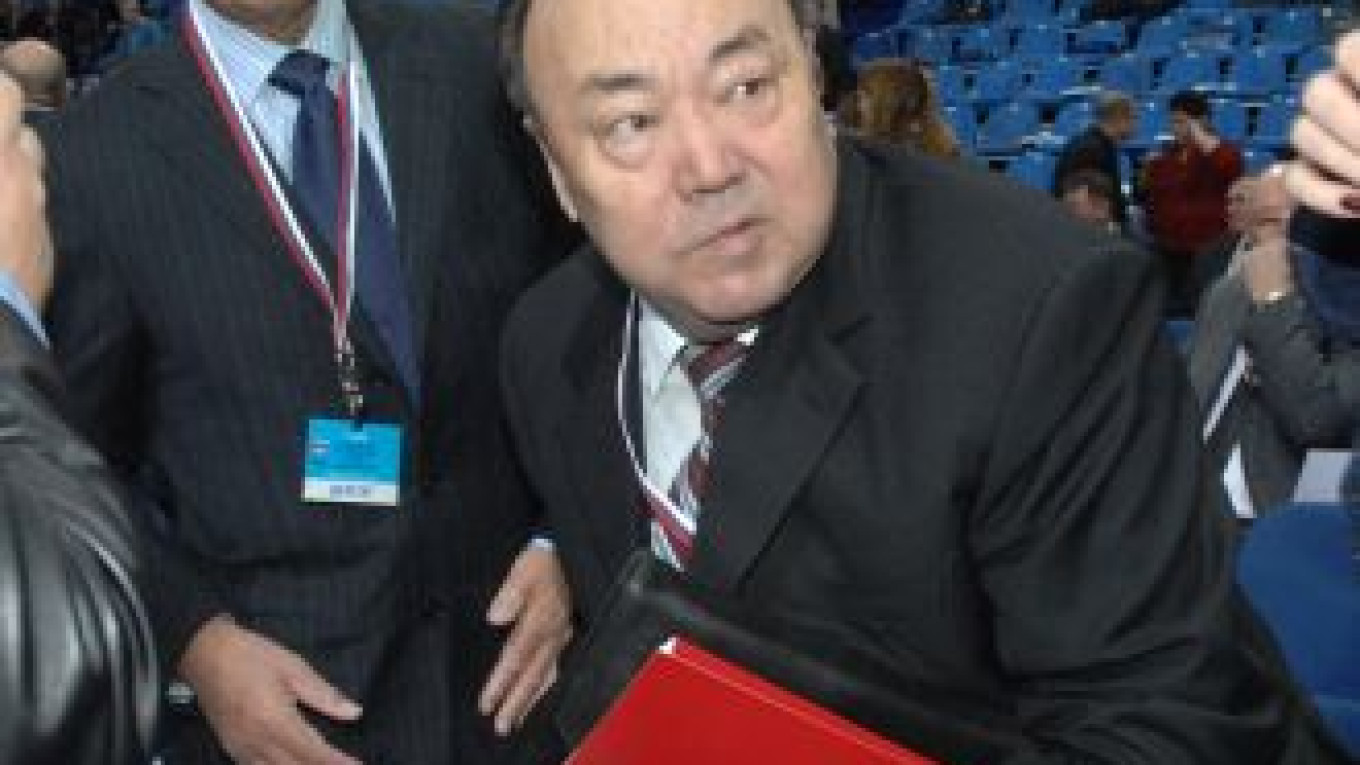A Kremlin bid to bring new blood to regional leadership scored an important win Tuesday as two presidents, Bashkortostan's Murtaza Rakhimov and Chuvashia's Nikolai Fyodorov, announced that they would resign after their terms expire.
United Russia immediately named three candidates for Chuvashia, as well as for Karelia, a position that opened up with the incumbent leader's resignation last month.
But Rakhimov, 76, who is often accused of ruling oil-rich Bashkortostan with an iron fist, is immersed in talks about his successor with the Kremlin, according to a statement on his web site.
President Dmitry Medvedev suggested limiting regional bosses to three terms after appointing scandal-tainted Primorye Governor Sergei Darkin for a third term in January.
A number of old-guard governors have been dismissed since late last year, with most failing to influence the choice of their replacement.
In case of Fyodorov, whose fourth term in Chuvashia expires in August, his removal may be only a prelude to career advancement.
Fyodorov, 52, is respected by the Kremlin and may become the presidential envoy to the Siberian or Volga federal district, Vedomosti reported Tuesday, citing a senior United Russia official who spoke on condition of anonymity.
Rakhimov's situation is more complex, as evidenced by the fact that he is discussing possible replacements with Kremlin chief of staff Sergei Naryshkin even though his fourth term expires only in October 2011, the statement on Rakhimov's web site said.
Rakhimov may get an honorary sinecure, and the Kremlin is likely to replace him with a member of the local elite, not an outsider, said Rostislav Turovsky, an independent regional analyst.
Such a tact would prevent backlash against major companies with a strong presence in the republic, he said. State-owned or state-friendly companies such as Gazprom and billionaire Vladimir Yevtushenkov's Sistema control the republic's key oil, energy and metals industries, Turovsky said.
"Nothing radical can happen in the republic's economy," he said. "Rakhimov's successor will inevitably have connections in the republic."
Rakhimov's replacement will have to come from the regional elite because the federal authorities do not want a redistribution of property, said Alexei Mukhin, an analyst with the Center for Political Information.
He also said Moscow may hand Bashkortostan's reins to a person connected to Sistema, which already has a strong position in the region after gaining control of the republic's main oil producer, Bashneft, as well as three refineries, a petrochemicals plant and an oil trader in spring 2009.
But analysts were divided as to whether Rakhimov would have a say about his successor.
Mukhin doubted it, saying Rakhimov had fallen out of the Kremlin's favor after criticizing United Russia for monopolizing power.
"Rakhimov doesn't have the least bit of support on the federal level," Mukhin said.
But Turovsky said the fact that successor talks are public knowledge and have started a year before Rakhimov's departure means that the incumbent has a chance to influence the outcome.
With Rakhimov's departure, all eyes will be on Moscow's veteran mayor, Yury Luzhkov, who is winding up his fourth term. Luzhkov has insisted that he has no plans to leave.
Meanwhile, United Russia has sent Medvedev lists of candidates to head Karelia and Chuvashia, the party said in a statement Tuesday.
These lists spelled no drastic change in staffing policy, being comprised of senior officials from the two regions and a low-profile State Duma deputy.
Candidates for Chuvashia are its prime minister, Nina Suslonova; agricultural minister, Mikhail Ignatyev; and Ruslan Tikhonov, the presidential envoy's representative in the region.
For Karelia, the party proposed acting regional head Andrei Nelidov, prime minister Pavel Chernov and Duma Deputy Viktor Kidyayev.
Karelia's previous head, Sergei Katanandov, resigned last month for unspecified personal reasons after serving three terms.
Other leaders who left their jobs in recent months include Sverdlovsk Governor Eduard Rossel, Tatarstan President Mintimer Shaimiyev, Khanty-Mansiisk Governor Alexander Filippenko and Rostov Governor Vladimir Chub.
Only Shaimiyev manage to negotiate a successor, his prime minister, with the Kremlin.
A Message from The Moscow Times:
Dear readers,
We are facing unprecedented challenges. Russia's Prosecutor General's Office has designated The Moscow Times as an "undesirable" organization, criminalizing our work and putting our staff at risk of prosecution. This follows our earlier unjust labeling as a "foreign agent."
These actions are direct attempts to silence independent journalism in Russia. The authorities claim our work "discredits the decisions of the Russian leadership." We see things differently: we strive to provide accurate, unbiased reporting on Russia.
We, the journalists of The Moscow Times, refuse to be silenced. But to continue our work, we need your help.
Your support, no matter how small, makes a world of difference. If you can, please support us monthly starting from just $2. It's quick to set up, and every contribution makes a significant impact.
By supporting The Moscow Times, you're defending open, independent journalism in the face of repression. Thank you for standing with us.
Remind me later.


